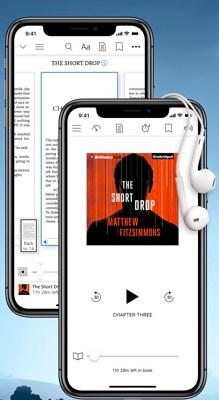You have /5 articles left.
Sign up for a free account or log in.
 Smartphones are either like cigarettes or comic books. Either bad for humans, or good for those who make their living telling us what is bad.
Smartphones are either like cigarettes or comic books. Either bad for humans, or good for those who make their living telling us what is bad.
The smartphone worrywarts have some evidence on their side. I’ll get to some disturbing smartphone numbers in a second, but first some smartphone love.
Smartphones are the best thing to happen to book lovers since the paperback. The iPhone is a bookstore, library, and narrator.
The biggest reason that we don’t read more books is not lack of desire, but a shortage of time.
With my iPhone, I’m able to listen to audiobooks while walking, cooking, and cleaning. The Kindle iOS app allows me to read e-books in short bursts. I’ll read a page or two while standing in line at the grocery store, or while eating my morning cereal.
Does the advantages of the iPhone for book discovery, portability and reading outweigh the costs of mobile computing for everything else?
The big worry about smartphones is that they are killing our ability to focus. Productive thinking requires our attention, and smartphones are attention magnets.
On average, smartphone users (which is everyone now) spend 3 hours and 15 minutes a day on their phones. The top 20 percent of smartphone users are on their devices for an average of 4.5 hours per day.
Smartphones have been associated with everything from rising levels of anxiety and depression among teenagers to damaging interpersonal relationships.
Professors find the use of smartphones so distracting for teaching and learning that 1 in 4 has banned them from their classes.
A recent MIT study showed that even a single day with access to their smartphone can cause college students to have elevated levels of stress and anxiety.
Some warning signs of smartphone addiction that I found online include:
- “Difficulty completing chores or work due to concentration issues.”
- "Seclusion from family and friends or using your phone when in conversation.”
- Masking of smartphone use by sneaking off to the bathroom at work.
- “Worry that you’re missing out on something when you’re not with your phone.”
- Feeling "anxious or irritable” when not with your phone
- Sleep problems.
There seems to be a growing acceptance that we can’t control our smartphone actions. A recent NYTimes article called "Do Not Disturb: How I Ditched My Phone and Unbroke My Brain" (2/23/19) received 495 comments.
Almost half of Americans have tried to limit their smartphone usage in the past, with only 30 percent being successful.
I could go on enumerating all the disturbing smartphone statistics.
My point is not that I don’t think that smartphones can cause problems for attention, focus, and interpersonal relationships. I’ll stipulate that we have not adjusted to the downsides of having the internet - and everything that comes along with the web - in our pockets.
What I am saying is that the advantages of being to store, listen to, and read books - wherever and whenever - outweigh all the smartphone negatives.
The audiobook and the e-book, purchased (or borrowed) and read/listened to on a smartphone, is the game changer for book lovers.
Strangely, the wonderful opportunities to spend more time reading books that smartphones have enabled has gone largely uncelebrated. Academics - we people of the book - should be overjoyed about the potential of the smartphone to increase reading time.
We should be making the argument that the problem with the smartphone is not the device, but how people use it. Delete that Facebook app. Get rid of Twitter. Take the games off the phone. Maybe even remove your e-mail accounts.
Keep the Kindle and Audible apps. (Or whatever e-book and audiobook app that you use).
Think only of the smartphone as a reading device and a bookshelf.
Do you use your phone to read books?




